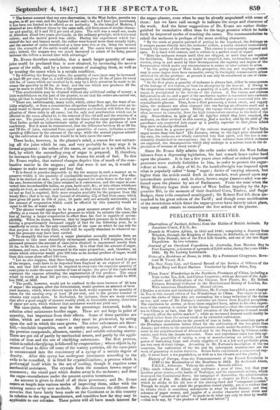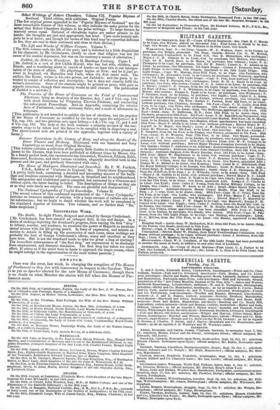PUBLICATIONS RECEIVED.
BOOKS.
Illustrations of Instinct, deduced from the Habits of British Animals. By Jonathan Couch, F.L.S., &c.
Travels in Western Africa, in 1845 and 1846; comprising a Journey from Whydah, through the Kingdom of Dahomey, to Adofoodia, in the interior. By John Duncan, late of the First Life Guards, and one of the late Niger Expedition. In two volumes.
Journal of an Overland Expedition in Australia, from Moreton Bay to Port Essington, a distance of upwards of 3,000 miles, during the years 1844- 1845. By Dr. Ludwig Leichhardt.
Notes of a Residence at Rome, in 1846. By a Protestant Clergyman. Reve- rend M. Vicary, B.A.
The New Navy List, and General Record of the Service of Officers of the Royal Navy and Royal hlariues. Conducted by Joseph Allen, Esq.
Three Years Wanderings in the Northern Provinces of China, including a Visit to the Tea, Silk, and Cotton Countries; with an Account of the Agri- culture and Horticulture of the Chinese, New Plants, &c. By Robert Fortune, Botanical Collector to the Horticultural Society of London, &c. With numerous Illustrations. Second edition.
[Besides a revision and incidental additions, Mr. Fortune has added a new chapter on Tea to this second edition of his Wanderings in China. The object is to ad- vocate the views of those who are contending for a large reduction of the duties on tea; and some of Mr. Fortune's statistics are drawn from English pamphlets. The conclusion he arrives at from these supplied facts, added to his own experi- ence of the country, is similar to Sir George Staunton's--that the consumption of tea in China is so vast, that the total cessation of the European demand would " scarcely affect the native market"; while an increased demand could readily be supplied either from the actual stock or by extended cultivation. blr. Fortune also alludes to the growth of teas in India. He considers parts of the Himalaya mountains better fitted for the cultivation of the tea-plant than Assam; and refers to the successful experiments made under the orders of Govern- ment in the neighbourhood of Almorah and in the Deyra Boon by Chinese culti- vators, sent from the Assam nurseries. Time and experience must test this opi- nion. The possibility of raising a crop or manufacturing an article, and the power of furnishing large and steady supplies of it at a low and profitable price, are two very diAinct things. According to Mr. Fortune's description of the tea countries, the cultivation of the tea and its subsequent manufacture are the work of peasantry of entire districts. Before India can furnish a commercial sup- ply, it must have a tea population, as well as a tea climate and tea plants.]
history of Europe, from the Commencement of the French Revolution in 1789 to the Restoration of the Bourbons in 1815. By Archibald Alison, F.R.S.E., Advocate. Volume the ninth. Seventh edition.
[This ninth volume of Alison only embraces a year of time, but that year involves great events,—the battle of Trafalgar, and its concurrent actions, 'ditch destroyed the Continental fleets; the campaign of Austerlitz; the administration and death of Fox. Mr. Alison also introduces a chapter on Pitt's finance, ist which he sticks to his old love of the sinking-fund and "compound irxterest.• Though be might not admit the proposition stated plainly, yet it is evident that he thinks there is something substantive in what be calls finance; and that schemes of paper money, and juggles of a similar character about debts sadtaxes, may "somehow or other' be made to do what can only be done by wealth —that is to say, by "the produce of land and labour."] Select Writings of Robert Chambers. Volume VII. Popular Rhymes of Scotland. Third edition, with additions. Original Poems.
[The few original poems appended to the " Popular Rhymes of Scotland" are the most remarkable feature of this volume, as they indicate the same genius for the actual that Robert Chambers displays in his prose writings. To large themes be scarcely seems equal. National or chivalrous topics are rather prosaic in his hands: the thoughts are just and appropriate, but level. Upon more homely sub- ,iects he is at home; and though his verses of this kind may be somewhat deficient in fire, they are real in their sentiment and close in their diction.]
The Life and Works of William Cowper. Volume V.
[The fifth volume ends the life of the poet; and is followed by a little disquisition on his character, by Mr. Grimshawe, chiefly to show that religion was not the cause of his mental depression, but was on the contrary a means of alleviation.]
Zaddok, the Hebrew Wanderer. By H. Hardinge Freiburg. Canto I. [Mr. Zaddok is a sort of Jew Childe Harold, who has lost wife, children, and friends, and is wandering about in search of truth—at least this is our interpre- tation of the state of affairs. His pilgrimage begins at Nice; and he is just ar- rived in England, via Marseilles and Paris, when the first canto ends. The author, like Byron, writes in his own person, not laddok's; and the poem is in- tended to consist of reflection and description: but it does not exactly fulfil the writer's intentions. Some of the stanzas might be printed as prose, with gain as regards structure, though their meaning would be still obscure. The publication of Zadrlok is a mistake.] The Practice of the House of Commons on the Trial of Controverted Elections; being an Analysis of the Election Act, 7 and 8 Viet. cap. 103; with short Directions for l'reparing Election Petitions, and conducting the subsequent Proceedings. And an Appendix, containing the relative Acts of Parliament, various necessary forms, and a scale of allowances to witnesses.
[This publication is not intended to exhibit the law of elections, but the practice of the House of Commons as modified by the late act upon the subject-7 & 8 Vic. cap. 103, and two previous acts upon bribery-4 & 5 Vic. cap. 57, and 5 and 6 Vic. cap. 102. The body of the book contains a seriatim account of the suc- cessive steps to be taken and the forms to be complied with in disputing a seat. The above-named acts are printed in the appendix, together with a variety of forms.]
Summer Excursions in the County of Kent, and along the Banks of the
. River Thames and Medway. Illustrated with one hundred and forty Engravings on wood, from Original Sketches. [This volume contains a collection of the pretty little Guides to various places ad- went to the Thames, that have been published at different times by Messrs. Orr. In a bandy pocket book, the excursionist has Greenwich, Woolwich, Eltham, Erith, Gravesend, Rochester, and their various vicinities, elegantly described both in the present and the past, and profusely illustrated with cuts.] The Home of Shakspere Illustrated and Described. By F. W. Fairholt, F.S.A., Author of " Costume in England," &c. Thirty-three Engravings. LA pretty little book, containing a detailed and interesting account of the build- mugs and localities connected with Shakspere in Stratford and its neighbourhood. The antiquarian and traditional part is compiled, but animated by a vivacious and critical spirit, the latter leaning to belief. The descriptions of things as they are or as they were lately are original. The cuts are plentiful and characteristic.] The National Cyclopedia of Useful Knowledge. Volume II. [The second volume of this condensed reproduction of the " Penny.Cycloptcdia" contains an immense number of articles, with a large amount of various and use- ful information; but we begin to doubt whether the work will be completed in the stipulated number of volumes. Two volumes, and no further than "Ba," looks suspicious.]
ILLUSTRATED WORK.
The Bottle. In eight Plates designed and etched by George Cruikshank. [Mr. Cruikahank has here entered an enlarged field, in size and design. In a series of etchings depicting the drunkard's progress, from tasting the first "drop" to infamy, murder, and madness, he emulates the power of Hogarth to inculcate moral lessons with his life-giving pencil. In force of expression, and minute at- tention to details in filling up the accessories of each scene, these etchings are probably the best of George Crnikshank's efforts, many and excellent as they have been. But is not the drunkard made to take too great a leap at starting? The immediate consequences of " the first drop " are represented to be discharge from employment, and domestic desolation. The first drop has taken too much effect. It seems as if the artist were in haste to approach the tragic scenes, where he might indulge in the representation of the more violent passions.]
ERRATUM.
Ours was the error, last week, in charging the compilers of The Houses of Parliament as they Are with inaccuracy in respect to the Speaker. There is as yet no Speaker elected for the new House of Commons; though there is no doubt on what Member the choice will fall when the Houses of Par- liament meet.



























 Previous page
Previous page